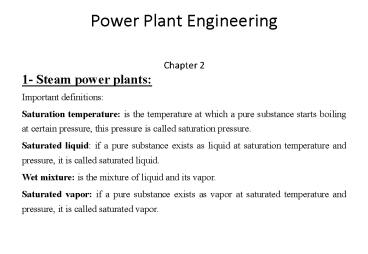Power Plant Engineering ????? ????? ?????? - PowerPoint PPT Presentation
1 / 11
Title:
Power Plant Engineering ????? ????? ??????
Description:
Power Plant Engineering Chapter 2 1- Steam power plants: Important definitions: Saturation temperature: is the temperature at which ... – PowerPoint PPT presentation
Number of Views:194
Avg rating:3.0/5.0
Title: Power Plant Engineering ????? ????? ??????
1
Power Plant Engineering????? ????? ??????
- Chapter 2
- 1- Steam power plants
- Important definitions
- Saturation temperature is the temperature at
which a pure substance starts boiling at certain
pressure, this pressure is called saturation
pressure. - Saturated liquid if a pure substance exists as
liquid at saturation temperature and pressure, it
is called saturated liquid. - Wet mixture is the mixture of liquid and its
vapor. - Saturated vapor if a pure substance exists as
vapor at saturated temperature and pressure, it
is called saturated vapor.
2
3
Moisture content (y) is the ratio of liquid mass
to the total mass (mass of liquid and mass of
vapor). Dryness fracture (x) is a ratio of
vapor mass to the total mass. As shown in
the above fig. ?f specific volume of saturated
liquid. ?g specific volume of saturated
vapor. ?fg difference between ?g and ?f (that
is , ?fg ?g- ?f) Enthalpy of vaporization
(hfg) or latent heat of vaporization, It
represent the amount of energy needed to vaporize
a unit mass of saturated liquid at a given
temperature or pressure. It decreases as the
temperature or pressure increases, and it is
becomes Zero at the critical point.
4
Super heated vapor When the temperature of the
vapor be higher than the sat. temperature of this
vapor is called super heated vapor. Degree of
super heated is the difference between the
sat. tem. And super heated tem.
Degree Tsup. - Tsat. Enthalpy of
water (hf) is the enthalpy of heat absorbed by
unit mass of water at constant pressure until it
reaches to the tem. Of vapor forming from (0
cº). hf C (T - 0) T
temp. of vapor forming. C specific
heat of water (4.2 kJ/kg.k) Enthalpy of dry
steam (hg) is the quantity of head which needed
to change unit mass of water at (0 cº) to dry
steam. hg hf
L(hfg) Enthalpy of wet steam (hx)
hx (1 - x) hf X hg This
relation can also be expressed as
hx hf x hfg , Where (hfg
hg- hf) Solving for quality, we obtain
5
Heat of super heated it is a quantity of heat
which added to saturated vapor in order to change
it to super heated vapor. Qsup hsup - hset.
Vapor Qsup Cpav. (Tsup - Tsat.
vapor) Enthalpy of super heated vapor
hsup hf L(hfg) Cp (Tsup - Tsat)
hsup hg Cp (Tsup - Tsat) Cp specific heat
of super heated vapor Specific volume of wet
steam ? (1 - x) ?f x ?g or ?
?f x ?fg for incompressible fluid ?f ltlt ?g
? x ?g The h - S diagram The h
- S diagram is also called MOLLier diagram. The
general features of h - S diagram are shown in
the following fig. The h - S diagrams are
commonly used in practice to determine the
properties of steam with reasonable accuracy.
6
(No Transcript)
7
The steam power plant cycles
- Steam is most common working fluid used in vapor
power plant cycles because of its many desirable
characteristics such as low cost, availability,
and high enthalpy of vaporization. Steam power
plants are commonly referred to as coal plant,
nuclear plant, or natural gas plant, depending on
the type of fuel used to apply heat to the steam.
But the steam goes through the same basic cycle
in all of them. Therefore, all can be analyzed in
the same manner.
8
The ideal Rankine cycle
9
Ideal Rankine Cycle on T- S Diagram
- The ideal Rankine cycle dose not involves any
internal irreversibilities and consists of the
following four processes - 1-2 Isentropic expansion in a turbine
- 2-3 P Constant , heat rejection in a condenser.
- 3-4 Isentropic compression in the pump.
- 4-5-1 P Constant , heat addition in a boiler.
10
Each process can be analyzed using steady flow
energy equation, ?KE and ?PE may be neglected.
- i.e. hi Q he W
- Boiler h1 Q4.5.1 h1 W
- W 0 , Q4.5.1 h1 - h4
- Turbine h1 1Q2 h2 1W2
- Q 0 , 1W2 h1 - h2
- Condenser h2 2Q3 h3 W
- since W 0 , 2Q3 - (h2 - h3)
- heat rejected in condenser h2 - h3
- Pump h3 3Q4 h4 3W4
- Q 0 , 3W4 h3 - h4 - (h4 - h3)
11
Work input to pump (h4 - h3) 3W4 is a small
quantity in comparison with 1W2 . Hence, it is
usually neglected (especially when boiler pr. are
low). Net work don in the cycle, Wnet 1W2 -
3W4 W (h1 - h2) -
(h4 - h3) or, if the feed pump work (3W4) is
neglected, W (h1 -
h2) The heat supplied in the boiler, Q4.5.1 h1
- h4 If the feed pump work (h4 - h3) is
neglected

